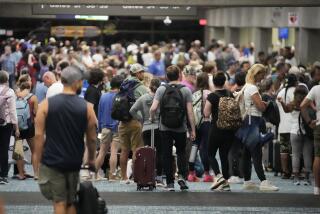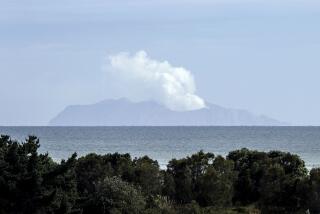For travelers, an Icelandic pain in the ash
- Share via
As drifting ash from the Icelandic volcano played havoc with flight schedules again this week, worried travelers continued to besiege trip insurers with one question: Am I covered?
No event in recent memory, not even the Sept. 11, 2001, attacks, has disrupted travel like the ash from Iceland’s Eyjafjallajokull volcano, which at one point last month grounded nearly 30% of the world’s air traffic and stranded millions of fliers for days in northern Europe and elsewhere.
For those holding travel-insurance policies, the finer points of terms such as “unforeseen event” can mean the difference between getting thousands of dollars in refunds from deposits on interrupted and cancelled trips or nothing. The confusion is so prevalent that even some insurance companies are continuing to re-evaluate their positions week to week.
Alexandra Dostrow, who lives in Moorpark, said she and two companions debated with their travel agent, who recommended that they buy travelers insurance, over whether their policies would cover them for deposits on an Egyptian tour. The trio was en route and became stranded in Paris last month when ash-driven airspace closures grounded flights.
They wound up filing a claim with their insurance company and as of Friday were still waiting for a settlement. The Egyptian tour was part of a planned journey with multiple destinations that totaled tens of thousands of dollars, Dostrow said.
David and Ellen Friedman of Seal Beach were thwarted by the same airspace closures. They hadn’t insured their April trip, and forfeited hundreds in deposits made to a Turkish tour operator. So for their next overseas adventure, a $10,000 bicycling trip to France this summer, they bought insurance.
This week, the Friedmans’ insurer, Omaha-based Travelex Insurance Services, confirmed that they would be covered for any trip disruptions caused by the Icelandic ash clouds, which some experts say could recur for months or even years.
The Friedmans and Dostrow are among an estimated 30% of U.S. travelers who rely on insurance to help them recover costs if their trips are canceled, interrupted or delayed or if they suffer other mishaps along the way. Premiums for popular package policies, covering a variety of situations, are typically 4% to 8% of the trip’s cost.
Collectively, Americans spend about $1.6 billion each year on premiums for travel insurance, according to a 2008 study by the U.S. Travel Insurance Assn., an industry group based in Washington that represents about 90% of such insurers.
Whether policyholders are covered for the repeated waves of airspace closures depends on who issued their policies, when they bought them and exactly what the policies say. The same company may sell several types of policies, each with different coverage rules, some of which may vary depending on the state in which the buyer lives.
Some policies won’t cover travelers for ash-caused flight disruptions if they bought their policy after April 14, when the Iceland volcano erupted. The underwriters reason that insurance is designed to cover the unforeseen, and that once the eruption happened, any consequences were foreseen.
Other policies treat each airspace disruption as a new event, so policyholders are covered for future events.
“We’re really kind of looking at it as weather,” Kathy Townend, marketing manager for CSA Travel Protection in San Diego, said of the ash clouds. “So if a thunderstorm is coming through, you know it’s thunderstorm season, but you don’t know when it’s going to strike.”
By CSA’s count, there have been four volcano-related travel disruptions since April 15, lasting from a few hours to a few days.
Because the course of ash clouds is unpredictable, coverage rules can shift like the wind, as David Friedman learned. When he bought his policy May 9, he had assumed it wouldn’t cover future ash clouds. In fact, it did. But had he bought the policy April 30, when he booked his bike trip, he would have been told that it didn’t.
That’s because some time between April 22 and May 7, the policy’s underwriter, which at first declined the coverage, reversed its position, said Sally Dunlap, a Travelex spokeswoman.
So even after studying the fine print on insurance contracts, which can run 20 pages or more, travelers may need to call their insurer to find out the latest rules.
This complexity may lead some globe-trotters to suspect that travel insurers look for reasons to deny claims, a charge that makes the companies bristle.
“That comment typically comes from people who didn’t look at what they were buying,” said Dan McGinnity, spokesman for Travel Guard North America, a major insurer based in Stevens Point, Wis. “Travel insurance is not a panacea that is going to cover every situation that comes up. But it is designed to protect the traveler against things that are most common.”
The airspace closures, unprecedented in their scope and unpredictability, have been anything but common.
“I don’t think people who were developing the polices were thinking: ‘What if an ash cloud from Iceland shuts down all the airports in Europe?’ ” McGinnity said.
Although they declined to state their total payouts, citing competitive and regulatory reasons, representatives for Travel Guard, Travelex and CSA said their companies have paid a number of claims arising from the ash clouds and are working to clear backlogs of paperwork.
Overall, the repeated air traffic disruptions have been “disastrous” for the industry, Dunlap said. Insurers said they are fielding up to three times the normal call volume from anxious policyholders, with no end in sight.
More to Read
Sign up for The Wild
We’ll help you find the best places to hike, bike and run, as well as the perfect silent spots for meditation and yoga.
You may occasionally receive promotional content from the Los Angeles Times.






